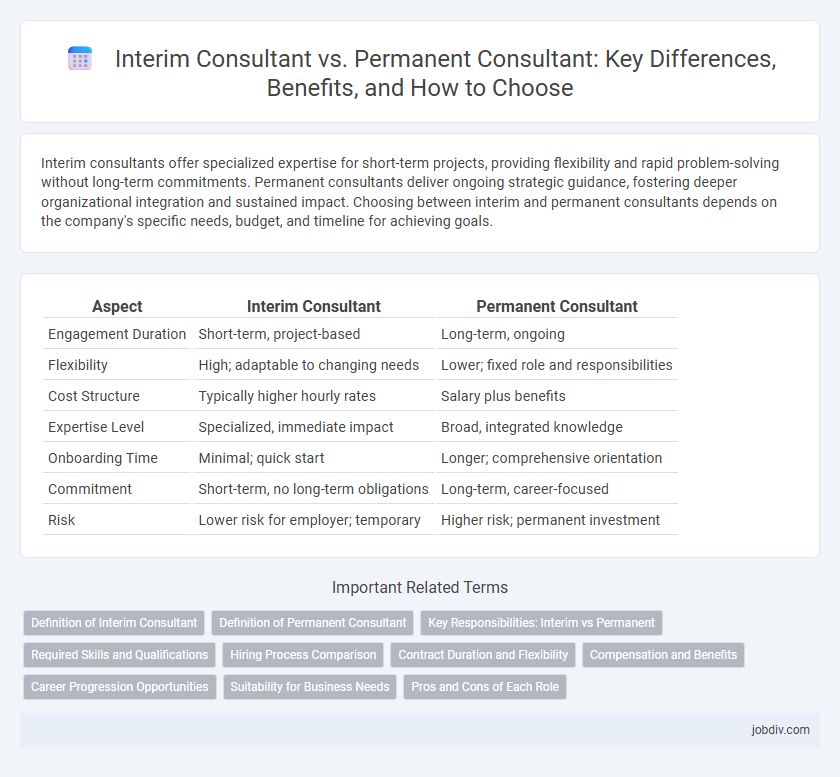Interim consultants offer specialized expertise for short-term projects, providing flexibility and rapid problem-solving without long-term commitments. Permanent consultants deliver ongoing strategic guidance, fostering deeper organizational integration and sustained impact. Choosing between interim and permanent consultants depends on the company's specific needs, budget, and timeline for achieving goals.
Table of Comparison
| Aspect | Interim Consultant | Permanent Consultant |
|---|---|---|
| Engagement Duration | Short-term, project-based | Long-term, ongoing |
| Flexibility | High; adaptable to changing needs | Lower; fixed role and responsibilities |
| Cost Structure | Typically higher hourly rates | Salary plus benefits |
| Expertise Level | Specialized, immediate impact | Broad, integrated knowledge |
| Onboarding Time | Minimal; quick start | Longer; comprehensive orientation |
| Commitment | Short-term, no long-term obligations | Long-term, career-focused |
| Risk | Lower risk for employer; temporary | Higher risk; permanent investment |
Definition of Interim Consultant
An Interim Consultant is a skilled professional hired on a temporary basis to address specific business challenges or manage critical projects during transitional periods. Unlike Permanent Consultants who have long-term roles within an organization, Interim Consultants provide flexible, expert solutions with immediate impact and defined durations. Their expertise often spans change management, crisis resolution, and strategic implementation, enabling organizations to maintain continuity and achieve short-term objectives efficiently.
Definition of Permanent Consultant
A Permanent Consultant is a full-time professional hired directly by an organization to provide long-term expertise and support within a specific area or project. Unlike interim consultants who work temporarily on contract bases to address immediate needs, permanent consultants integrate deeply into company culture and contribute continuously to strategic growth. Their ongoing presence enables sustained relationship-building and adaptation to evolving business objectives.
Key Responsibilities: Interim vs Permanent
Interim consultants focus on delivering specific projects, managing change, and providing expert insights during transitional periods, often with a temporary, results-driven mandate. Permanent consultants maintain ongoing client relationships, develop long-term strategies, and support continuous improvement within the organization. Key responsibilities differ as interim roles emphasize rapid problem-solving and adaptability, while permanent roles prioritize strategic planning and sustained organizational growth.
Required Skills and Qualifications
Interim consultants require strong adaptability, project management skills, and expertise in change management to deliver immediate impact within limited timeframes. Permanent consultants need deep industry knowledge, long-term strategic planning abilities, and proficiency in stakeholder relationship management to support ongoing organizational growth. Both roles demand excellent communication, problem-solving skills, and relevant certifications such as PMP or Six Sigma to validate expertise.
Hiring Process Comparison
Interim consultants streamline the hiring process with faster onboarding and flexible contracts, reducing time-to-deployment compared to permanent consultants who require extensive recruitment, background checks, and longer training periods. The selection criteria for interim consultants emphasize specialized skills and immediate availability, whereas permanent hires often prioritize cultural fit and long-term potential. Cost implications also differ, as interim consultants typically command higher hourly rates but avoid long-term benefits and severance expenses inherent in permanent positions.
Contract Duration and Flexibility
Interim consultants typically engage in short-term contracts ranging from a few weeks to several months, offering high flexibility for businesses needing immediate, specialized expertise without long-term commitment. Permanent consultants are employed on ongoing contracts with indefinite duration, providing consistent support and in-depth knowledge tailored to the company's long-term goals. The choice between interim and permanent consulting depends on project duration, budget constraints, and flexibility requirements.
Compensation and Benefits
Interim consultants often receive higher hourly or daily rates compared to permanent consultants due to the temporary nature and specialized expertise required for projects. Permanent consultants benefit from a stable salary, comprehensive benefits packages including health insurance, retirement plans, and paid leave, which interim consultants typically lack. The cost-efficiency of permanent consultants lies in long-term value and continuity, while interim consultants command premium compensation for flexibility and immediate impact.
Career Progression Opportunities
Interim consultants often gain diverse industry experience quickly, enhancing their adaptability and expanding their professional network, which can accelerate career progression in dynamic or project-based roles. Permanent consultants benefit from structured career paths within organizations, including promotions, training programs, and leadership development, fostering long-term stability and expertise accumulation. Choosing between interim and permanent consultancy depends on individual career goals, with interim roles offering flexibility and breadth, while permanent positions provide depth and organizational advancement.
Suitability for Business Needs
Interim consultants offer flexible, short-term expertise tailored to specific projects or crisis management, making them ideal for businesses seeking rapid solutions without long-term commitment. Permanent consultants provide ongoing strategic insight and continuity, benefiting organizations focused on sustained growth and consistent advisory support. Choosing between them depends on the business's immediate objectives versus long-term operational requirements.
Pros and Cons of Each Role
Interim consultants offer flexibility and specialized expertise for short-term projects, allowing businesses to address immediate challenges without long-term commitments, but may lack deep organizational insight compared to permanent consultants. Permanent consultants provide continuity and a deep understanding of company culture, enabling them to drive long-term strategic initiatives, though they may be less adaptable to sudden changes and project-specific needs. Choosing between interim and permanent consultants depends on project scope, budget constraints, and the desired balance between agility and institutional knowledge.
Interim Consultant vs Permanent Consultant Infographic

 jobdiv.com
jobdiv.com